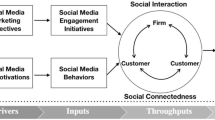Abstract
A longstanding debate exists in both academic literature and popular culture about whether non-informative marketing tactics are manipulative. However, given that we tend to believe that some marketing tactics are manipulative and some are not, the question that marketers, their critics, and consumers need to ask themselves is that of how to actually determine whether any particular marketing tactic is manipulative and whether a given manipulative tactic is, in fact, immoral. This article proposes to operationalize criteria that can be used by marketers for making such determinations and attempts to provide some clarification toward our under- standing of the concept of manipulation and the conditions for the moral acceptability of manipulative marketing practices. It argues that a marketing tactic is manipulative if it is intended to motivate by undermining what the marketer believes is his/her audience’s normal decision-making process either by deception or by playing on a vulnerability that the marketer believes exists in his/her audience’s normal decision-making process. Such a tactic is morally objectionable on several grounds, which make it morally impermissible unless outweighed by sufficient “redemptive” moral considerations.
Similar content being viewed by others
References
Arrington, R. L.: 1982, ‘Advertising and Behavior Control’, Journal of Business Ethics 1(1), 3–12
Baker, S. and Martinson, D.L.: 2001, ‘The TARES Test: Five Principles for Ethical Persuasion’, Journal of Mass Media Ethics 16(2), 148-175
Carson T. L.: 1988, ‘On the Definition of Lying: A Reply to Jones and Revisions’ Journal of Business Ethics 7(7), 509-514
Carson, T. L., R. E. Wokutch and K. F. Murrmann: 1982, ‘Bluffing in Labor Negotiations: Legal and Ethical Issues’, Journal of Business Ethics 1(1), 13-22
Crisp, R.: 1987, ‘Persuasive Advertising, Autonomy, and the Creation of Desire’, Journal of Business Ethics 6(5), 413–418
Cunningham, A.: 2003, ‘Autonomous Consumption: Buying into the Ideology of Capitalism’, Journal of Business Ethics 48(3), 229-236
Durham, T.R.: 1984, ‘Information, Persuasion, and Control in Moral Appraisal of Advertising Strategy’, Journal of Business Ethics 3(3), 173-180
Emamalizadeh, H.: 1985, ‘The Informative and Persuasive Functions of Advertising: A Comment’’, Journal of Business Ethics. 4, 151-153
Federal Trade Commission: June 3, 2004, ‘KFC’s Claims that Fried Chicken is a Way to “Eat Better” Don’t Fly’, http://www.ftc.gov/opa/2004/06/kfccorp.shtm.
Gardner, D. M.: 1975, ‘Deception in Advertising: A Conceptual Approach’, The Journal of Marketing 39(1), 40-46
Gogoi, P.: October 9, 2006, ‘Wal-Mart’s Jim and Laura: The Real Story’ Businessweek.com. http://www.businessweek.com/bwdaily/dnflash/content/oct2006/db20061009_579137.htm.
Greenspan, P.: 2003, ‘The Problem with Manipulation’, American Philosophical Quarterly 40(2), 155-164
Hunt, S.D.: 1976, ‘Informational vs. Persuasive Advertising: An Appraisal’, Journal of Advertising 5(3), 5-8
Hunt, S.D. and Vitell, S. J.: 2006, ‘The General Theory of Marketing Ethics: A Revision and Three Questions’, Journal of Macromarketing 26(2), 143-153
Jones, G. E.: 1986, ‘Lying and Intentions’, Journal of Business Ethics 5(4), 347-349
Meyers-Levy, J. and Malaviya, P.: 1999, ‘Consumer’s Processing of Persuasive Advertisements: An Integrative Framework of Persuasion Theories’, Journal of Marketing 63, 45-60
National Public Radio: March 6, 2008, ‘Airborne Settles Suit over False Claims’, http://www.npr.org/templates/story/story.php?storyId=87937907.
Phillips, M. J.: 1997, Ethics and Manipulation in Advertising: Answering a Flawed Indictment (Quorum Books, Westport, CT)
Rudinow, J.: 1978, ‘Manipulation’, Ethics 88(4), 338-347
Santilli, P.C.: 1983, ‘The Informative and Persuasive Functions of Advertising: A Moral Appraisal’, Journal of Business Ethics 2(1), 27-33
Shabbir, H. and Thwaites, D.: 2007, ‘The Use of Humor to Mask Deceptive Ads: It’s No Laughing Matter’, Journal of Advertising 36(2), 75-85
Shaver, D.: 2003, ‘Toward an Analytical Structure for Evaluating the Ethical Content of Decisions by Advertising Professionals’, Journal of Business Ethics 48(3), 291-300
Shin, A.: December 12, 2006, ‘FTC Moves to Unmask Word-of-Mouth Marketing’, The Washington Post, http://www.washingtonpost.com/wp-dyn/content/article/2006/12/11/AR2006121101389.html.
Sneddon, A.: 2001, ‘Advertising and Deep Autonomy’, Journal of Business Ethics 33(1), 15-28
Valdman, M.: 2009, ‘A Theory of Wrongful Exploitation’, Philosopher’s Imprint 9(6), 1–14.
Waide, J.: 1987, ‘The Making of Self and World in Advertising’, Journal of Business Ethics 6(2), 73-79
Wood, A.: 1995 ‘Exploitation’, Social Philosophy and Policy Foundation 12(2), 136-158
Author information
Authors and Affiliations
Corresponding author
Rights and permissions
About this article
Cite this article
Sher, S. A Framework for Assessing Immorally Manipulative Marketing Tactics. J Bus Ethics 102, 97–118 (2011). https://doi.org/10.1007/s10551-011-0802-4
Published:
Issue Date:
DOI: https://doi.org/10.1007/s10551-011-0802-4




